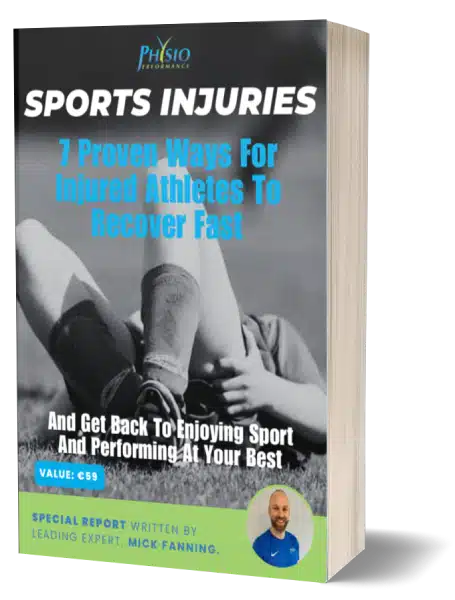If you’ve suffered with sports injuries you have probably heard a range of stories and opinions from friends and family, and even outdated advice from doctors which has left you confused, frustrated and unable to get long-term relief.
Here are some of the most common Sports Injury myths people who visit our Drogheda clinic have been told which has actually made their pain much worse, and stopped them living the life they deserve.
MYTH #1 - NO PAIN NO GAIN
The number one myth Mick hears constantly is “no pain, no gain,” with people trying to push through the pain.
One of the most prevalent misconceptions is that athletes should push through their pain to achieve their goals. However, pain is the body’s way of signalling that something is wrong and ignoring pain can lead to increasing the damage, prolonging recovery, and the injury could even develop into chronic pain – which is pain that lasts for 3 months or more.
Mick would always recommend prioritising long-term health and performance sustainability over short-term gains achieved through potentially harmful practices that can leave you sidelined for much longer than necessary. It’s crucial to listen to your body and seek appropriate medical advice from the experts here at Physio Performance in Drogheda, Co. Louth.
With effective rehabilitation programs, Mick Fanning has seen huge success in his practice, incorporating rest days, advice on proper nutrition, and techniques like stretching and strengthening exercises designed to enhance performance while minimising injury risks. Pain should be viewed as a guide rather than an obstacle. Understanding and respecting pain can help athletes and active adults identify when to modify their training, seek expert guidance, or employ rehabilitation strategies.
MYTH #2 - REST IS THE BEST SOLUTION
The second myth that Mick has encountered is that rest is always seen as the best solution. While rest is an essential component of injury recovery, it’s usually only a temporary fix. Relative rest is probably a better term as opposed to complete rest because complete immobilisation can result in muscle atrophy, joint stiffness and decreased range of motion in many cases.
Many injuries result from biomechanical issues or deficiencies in conditioning that rest alone cannot address. For example, injuries caused by poor running form or inadequate core strength require targeted interventions to correct these underlying problems. Physical therapists and sports medicine professionals can provide guidance on exercises and techniques designed to address specific weaknesses or imbalances. Without these targeted interventions, athletes who rely solely on rest may find themselves trapped in a cycle of recurring injuries, as the root causes remain unaddressed.
Getting a tailored rehabilitation program that includes targeted exercises, stretching and strengthening can facilitate a faster and more effective recovery. And that’s one of their strongest core beliefs at Physio Performance in Drogheda: getting you moving as quickly as you can to prevent any of these issues from occurring.
MYTH #3 - SPORTS INJURIES ONLY HAPPEN TO ATHLETES
Mick Fanning often hears from patients who believe sports injuries only affect seasoned athletes. While increased activity can raise the risk of injury, anyone, from recreational athletes to weekend warriors, can sustain injuries.
To reduce the risk, it’s essential to understand proper techniques like warm-ups, load management, cool-downs, and strengthening exercises. Those with sedentary lifestyles are especially vulnerable to injuries if they suddenly increase activity without building strength and endurance gradually. This can lead to acute injuries or chronic issues. Mick and his team at Physio Performance emphasize the importance of educating individuals on safe, gradual activity increases, alongside stretching and strength training.
Sports injuries are not inevitable. With proper training, conditioning, and injury prevention strategies, the risk can be minimized. Regular strengthening exercises, flexibility, proper equipment, and managing training loads are key to reducing injury chances. Mick’s experience with teams shows that following a structured process significantly lowers injury risk, a core belief at his performance clinic in Drogheda. The clinic emphasizes a proactive approach to injury prevention, especially for those returning to or starting a new sport.
Previous slide
Next slide
Are You Upset, Unsure or Even Confused About these myths that people you trusted have told you - Which have probably led to more pain & injuries?
I know how upsetting it can be when you don’t know why you’re in pain, or struggling to move freely – and my expert team would love to help you get some clarity in a quick, Free Telephone Call.
Simply click the button below, and arrange a Free Telephone Consultation with our expert team who can answer your questions, listen to your story, and end your uncertainty, confusion and frustration.
Get Your Free Copy Of This Report, Written by Drogheda's Sports Injury Expert, Mick Fanning
Simply Complete The Short Form and We’ll Email You Your FREE REPORT

Want Help To Decide If Physiotherapy Is Right For You?
FREE Discovery Visit
Are you unsure if Physiotherapy is right for you? Would you prefer to talk with a Physio before making a decision? All you have to do is click the link below to fill out a simple form.
Request A Call Back
If you’re not quite ready to book an appointment yet and have some questions you would like answered first, click the link below to complete the form.
